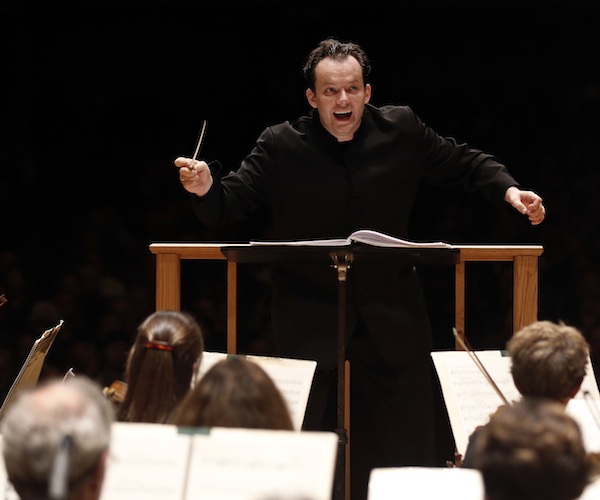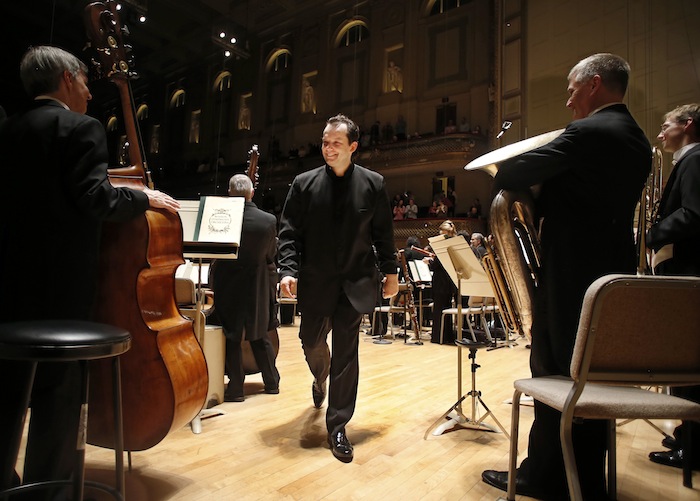Concert Review: Andris Nelsons conducts Beethoven, Bartók, and Tchaikovsky
The Boston Symphony Orchestra played with palpable enthusiasm. Andris Nelsons conducted with characteristic energy. There was, by the end of the evening, certainly, quite a bit about which to be happy.

Andris Nelsons led the BSO in Beethoven, Bartok, and Tchaikovsky in his first subscription program of the 2014-15 season. Photo: Winslow Townson.
By Jonathan Blumhofer
You could twist yourself into knots trying to discern the programming logic behind Andris Nelsons’s first full subscription series as Boston Symphony Orchestra (BSO) music director (through October 3). On paper, Beethoven’s Eighth Symphony, the Suite from Bartók’s The Miraculous Mandarin, and Tchaikovsky’s Symphony no. 6 don’t have much in common. In concert, no bright threads connect them. Yet somehow they fit together well enough on Wednesday night. The BSO played with palpable enthusiasm. Nelsons conducted with characteristic energy. There was, by the end of the evening, certainly, quite a bit about which to be happy.
Beethoven’s Symphony no. 8 is the sunniest of his symphonies. Hardly a cloud darkens its pages. In its wit and humor, it’s possibly the most Haydn-esque thing he ever wrote. And, because of that, it’s probably the most difficult of his nine symphonies to pull off.
Wednesday’s performance featured marvelous accounts of the two middle movements. The clever, metronome-inspired second tripped and whirled whimsically and the delightful, sometimes downright funny, send-up-of-the-Classical-minuet third featured an energetic, rustic solo from BSO associate principal cello Martha Babcock paired with some glowing horn, clarinet, and double bass playing in its trio section.
But the first movement tended towards square-ness. It was generally too stiff and rigid. The humor felt forced. Only towards the climax of the development did Nelsons really ratchet up the heat, and then things cooled off again during the recapitulation.
The finale had its moments too, but, to these ears at least, was more dud than hit. Here the problem lies with Beethoven, above all. Simply put, there’s not enough dramatic tension in the movement to justify its length. The finale of the Seventh has drama to spare. So does the unwieldy conclusion of the Ninth. But the Eighth’s is just too carefree, too genial for its own good. It rambles and overstays its welcome.
Such was the case Wednesday. You need a great performance of the movement to make it work and this one, while very good, just didn’t quite click.
The opening section of Bartók’s The Miraculous Mandarin Suite didn’t quite click, either. It was too rounded and genteel, not nearly savage enough. But, after the introduction subsided, Nelsons seemed to flip a switch. Suddenly, the score’s dazzling colors and harrowing sound world came to life. The winds, led by William Hudgins’ wild, seductive clarinet solos, reeled. The brass snarled. The strings – with the violas in the fore – dug into Bartók’s hearty, often violent writing with abandon. From an unpromising beginning came a powerful, memorable Mandarin.
Most impressive about this performance was its textural clarity. All of its moving parts could be heard. Especially discernable was the balance between harp and piano in combination with various other instrumental entities, which lent the music’s softer passages a weird, distinct intensity. If only, I found myself thinking, Nelsons had dared to program this dark, lurid music on his inaugural concert. Oh, well. I look forward to more Bartók from him (maybe a Bluebeard’s Castle?) in coming years.
Seventy-some years ago, Virgil Thomson talked about the importance of the Grand Line. He described it as an artist’s “reasoned conception of any musical work as a unit unrolling itself in time, rather than as a series of more or less interesting moments.” When the focus is on the Line, Thomson wrote, “the tempos naturally fall into place…[and] it…becomes possible to refine and elaborate the detail to quite a high degree.”
On Wednesday, Nelsons’ Tchaikovsky Six followed the Grand Line from start to finish. Everything flowed easily. Just about all of his tempos felt completely natural. Nelsons didn’t fall victim to the temptation some older and more experienced hands have shown for making mincemeat of the piece, contorting and twisting the little things all out of proportion. No, his focus here was on the details of the melodic line and on Tchaikovsky’s singular way of writing for the orchestra.
That said, it was also very much a young man’s interpretation of the Pathétique. That is to say, tempos tended to be on the brisk side. Nelsons didn’t dally over the symphony’s sentimental moments, like the lovely second theme of the first movement. On the contrary, he tended to either take them in good stride or, sometimes (like at points in that first movement), to blast right through them. This was a passionate, full-throttle reading. It will be revealing to hear Nelsons’ take on the piece in twenty-five or thirty years.
If Wednesday’s performance wasn’t note-perfect – it was marred, from time to time, by ragged entrances and there was some patchy intonation here and there – that’s not to say that, on the whole, it wasn’t handsomely played. The opening and closing movements were, especially. In them, Nelsons captured the cyclical nature of the piece, beginning and ending at the same hushed dynamic level: in the first movement, the opening low string chord appeared out of nowhere; in the finale, he got the orchestra to imperceptibly straddle the fine line between sound and silence.
In between came great solo moments for many of the BSO’s principal players and some of its sections. Principal bassoon Richard Svoboda’s several rich, bucolic turns in the spotlight made him a leading star of the first movement. So, too, was principal clarinet Hudgins and the orchestra’s ever-extraordinary principal flute, Elizabeth Rowe.
The brass made the most of the magnificent, often loud, writing Tchaikovsky gave them in the famous third movement. Here (and, especially, in the finale) it would have been nice to have the violins seated across from each other (as James Levine used to do) to better capture the antiphonal writing in the score; Nelsons seems averse to this practice. Still, the playing was energetic if, by the end, a bit monochrome, dynamically (though I concede that the gradations between ff, fff, and ffff are, in practice, relative and rather minute).
In the second movement, which began liltingly, Nelsons found the warm, somber undercurrent that pulses through the movement’s middle part and rode it for all it’s worth. It was haunting.
So, too, was the finale, once it really settled in and started to sing. This is a movement that has its share of dramatic pauses and silences. In a lesser performance, they can simply feel like dead time. Here they were charged, focused, electric. And they were topped off with that extraordinary decrescendo into the (emotional, at least) abyss. Nelsons managed to hold the silence at the end for what seemed a good fifteen or twenty seconds before it was broken by applause. Considering the often-barky constitution of Wednesday’s audience, perhaps that’s the most telling commentary on this performance of all.
Unlike Saturday’s gala, Wednesday’s concert wasn’t sold out. But it was well attended (and certainly more crowded than some Thursday- and Saturday-night concerts I’ve been to in recent seasons). Dotted among the white-, gray-, and blue-hairs was a notable contingent of younger people in the audience. Noting this, I drove home thinking that, perhaps, the BSO should take a page from the Pops playbook and have a monthly college night of some sort. It could be a way to revitalize the now-driftless Underscore Friday series. Or, if Friday patrons were to object, it could be held on a Tuesday or Wednesday night. Advertise the thing. Hype it. Give everybody of age a free drink (like on opening night). Have Nelsons talk to the audience and introduce the program. He’s already the face of the organization – why couldn’t he be the voice of it, too? There’s no better moment than the present. Might as well seize it.
Jonathan Blumhofer is a composer and violist who has been active in the greater Boston area since 2004. His music has received numerous awards and been performed by various ensembles, including the American Composers Orchestra, Kiev Philharmonic, Camerata Chicago, Xanthos Ensemble, and Juventas New Music Group. Since receiving his doctorate from Boston University in 2010, Jon has taught at Clark University, Worcester Polytechnic Institute, and online for the University of Phoenix, in addition to writing music criticism for the Worcester Telegram & Gazette.

